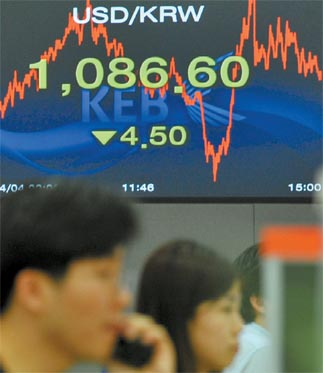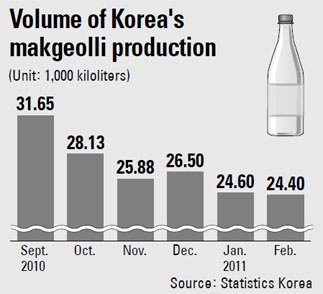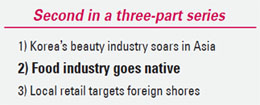
Market Information > 한국 농식품 시장뉴스
한국 농식품 시장뉴스
April 05, 2011
2011.04.05
1. BILATERAL/MULTILATERAL ISSUES
Heads could roll over FTA mistakes [English, CSY]
http://joongangdaily.joins.com/article/view.asp?aid=2934392
Summary: Minister of Foreign Affairs and Trade Kim Sung-hwan warned that anyone responsible for mistranslations in Korean free trade agreements will risk losing their jobs - including the nation’s top trade negotiator, diplomatic sources told the JoongAng Ilbo yesterday. “It is a strong warning for the whole ministry staff, including Trade Minister Kim Jong-hoon,” a high-ranking ministry official said. Kim Jong-hoon, making a public apology for mistranslations in the Korea-EU free trade agreement yesterday, admitted that as many as 207 errors and omissions were spotted in the most recent translation. He said all the errors have been corrected.
Trade minister apologizes for errors in translation of EU FTA text [English, OYS]
http://english.yonhapnews.co.kr/news/2011/04/04/0200000000AEN20110404007500320.HTML
Summary:
The trade ministry said it has found a total of 207 errors and omissions in the Korean language version of the free trade agreement with the EU.
2. ECONOMIC ISSUES
Korean Won – U.S. Dollar Exchange Rate Resumes to $1 = 1,080 Won Level in 2 Years and 7 Months [Korean, OSY]
http://www.mt.co.kr/view/mtview.php?no=2011040415422313036&HYG
Summary: The exchange rate of Korean won against U.S. dollar marked $1 = 1,086 on April 4, which was the lowest rate (strongest Korean won) in 31 months. Many bankers are betting for a trend of stronger Korean won in the coming months.
Won’s value hits 30-month high [English, OYS]
Boosted by overseas bond, stock buying
http://joongangdaily.joins.com/article/view.asp?aid=2934380
Summary: The Korean won yesterday passed the 1,090 won mark to the U.S. dollar for the first time in 30 months as foreign investors increased investments in the country’s financial markets.
Despite the strengthening won, analysts said it will not dent export growth.
The Korean won yesterday closed 1,086.60 won against the U.S. dollar, an increase of 4.50 won from the previous trading day, reaching the level last set in September 2008 when the won appreciated more than 1,090

A board at Korea Exchange Bank headquarters in Myeong-Dong, downtown
Listed Firms Post Record Operating Profits in 2010 [English, OYS]
http://english.chosun.com/site/data/html_dir/2011/04/04/2011040400911.html
Summary: Listed companies on the Korean stock market posted all-time high operating profits in 2010, up nearly 40 percent from the year before.
According to a report released jointly by the Korea Exchange and the Korea Listed Companies Association on Sunday, the combined net operating profit of some 1,400 listed firms totaled W95 trillion last year on the back of increased domestic demand and strong exports (US$1=W1,092).
Analysts say that since Korean firms went through structural reforms during the Asian financial crisis in the late 1990s they were adequately prepared for the global financial crisis that started in 2008.
3. MARKETING ISSUES
Haitai Increases Price of Snack Food Products by 8 Percent [Korean, OSY]
http://www.yonhapnews.co.kr/economy/2011/04/05/0318000000AKR20110405000151003.HTML
Summary: Haitai, a leading snack food manufacturer, announced on May 8 that it will increase the price of its products to the retailers by 8 percent on average. Additional food manufacturers are expected to announce price increases in the coming weeks.
Makgeolli demand falls for first time since 2008 [English, CSY, OSY]
http://joongangdaily.joins.com/article/view.asp?aid=2934368
Summary:

Koreean food tickles the world’s taste buds [English, OYS, CSY]
Second in a three-part series: Food industry goes native
http://joongangdaily.joins.com/article/view.asp?aid=2934377

4. OTHER MISCELLANEOUS ISSUES
Local farm, fish products safe from radiation [English, CSY]
http://english.yonhapnews.co.kr/business/2011/04/05/60/0501000000AEN20110405002000320F.HTML
Summary: Local farm and fishery products are safe from radioactivity despite traces of radionuclides detected in the atmosphere in the past week, the government said Tuesday. The farm ministry said it collected and checked 58 different samples of agricultural and fisheries products, and all showed no abnormal levels of radiation. The inspections were carried out to alleviate public concerns that fallout from
S. Korean apples to be exported to
http://english.yonhapnews.co.kr/business/2011/04/05/0501000000AEN20110405001700320.HTML
Summary: South Korean apples will be exported to the
Tests Found No Radioactive Contamination in Local Agricultural & Fishery Products [Korean, OSY]
http://www.yonhapnews.co.kr/economy/2011/04/05/0301000000AKR20110405038900002.HTML
Summary: The Ministry of Agriculture, Forestry, Fishery, and Food (MAFFF) announced on April 5 that it had tested a total of 58 local agricultural and fishery products for radioactive contamination so far, and found no contamination. The ministry added that its test will include live stock products including fluid milk from this week.
A salt rush as consumers fear Japanese radiation [English, OYS]
http://joongangdaily.joins.com/article/view.asp?aid=2934391
Summary: Park Jae-seon, a homemaker from Gwanak District, southwestern
“There was bamboo salt, sea salt, salt in larger grains, smaller grains,” she remembered. Hearing from her friend that many homemakers in the area had been in a salt-buying binge, Park rushed out that day to her neighborhood store - to find there was salt to be begged or borrowed.
The information in this report was compiled by the Agricultural Trade Office (ATO) at the U.S. Embassy in Seoul, South Korea. The press summaries contained herein do NOT reflect USDA, the U.S. Embassy, or other U.S. government agency official policy or view point. U.S. food exporters can learn more about market opportunities in South Korea by reviewing ATO Seoul’s Exporter Guide and other reports available at www.fas.usda.gov by clicking on “attaché reports”.
Agricultural Trade Office, U.S. Embassy - Seoul
Tel: 82-2-6951-6848 Fax: 82-2-720-7921
Email: atoseoul@state.gov